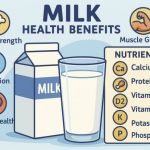Chicken eggs are one of the most widely consumed and versatile foods in the world. Packed with essential nutrients, easy to prepare, and affordable, they are a staple in nearly every cuisine. Beyond their culinary use, eggs have long been studied for their health effects — both positive and, in some debates, controversial. When consumed in moderation and properly cooked, chicken eggs are a highly beneficial part of a balanced diet.
Nutritional Composition of Chicken Eggs
A standard chicken egg contains a rich combination of high-quality protein, healthy fats, vitamins, and minerals. One large egg provides:
- Around 6–7 grams of complete protein with all nine essential amino acids;
- Vitamin B12, riboflavin, selenium, and choline, important for brain function;
- Vitamin D, naturally present in the yolk, which supports bone health;
- Small amounts of iron, zinc, and vitamin A;
- Roughly 70–80 calories per egg.
The egg yolk contains most of the vitamins and fat, while the egg white (albumen) provides most of the protein with almost no fat.
Health Benefits of Eggs
Eggs offer several notable health benefits:
- Muscle maintenance and satiety due to their complete protein;
- Eye health, thanks to antioxidants like lutein and zeaxanthin;
- Brain function support through choline, vital for neurotransmitter synthesis;
- Help in weight control, as eggs are filling and low in calories;
- Support in pregnancy, providing nutrients essential for fetal development.
Despite past concerns about cholesterol, recent studies show that dietary cholesterol in eggs has minimal effect on blood cholesterol for most people. In fact, moderate egg consumption (1 per day) is considered safe and beneficial for healthy individuals.
Culinary Uses and Food Safety
Eggs are incredibly versatile. They can be:
- Boiled, poached, fried, or scrambled;
- Used in baking to provide structure, moisture, and richness;
- Emulsified into sauces like mayonnaise or hollandaise.
To reduce the risk of salmonella, eggs should be:
- Cooked thoroughly or pasteurized if raw;
- Stored in the refrigerator;
- Washed before cracking if visibly dirty.
Organic and free-range eggs may offer better taste and slightly different nutritional profiles, but even standard eggs are highly nutritious.
Glossary
- Choline: A nutrient important for brain development and function.
- Essential amino acids: Protein components that the human body cannot produce on its own.
- Lutein and zeaxanthin: Antioxidants that support eye health.
- Albumen: The egg white, rich in protein and low in fat.
- Salmonella: A bacterium that can cause foodborne illness, especially from raw eggs.


